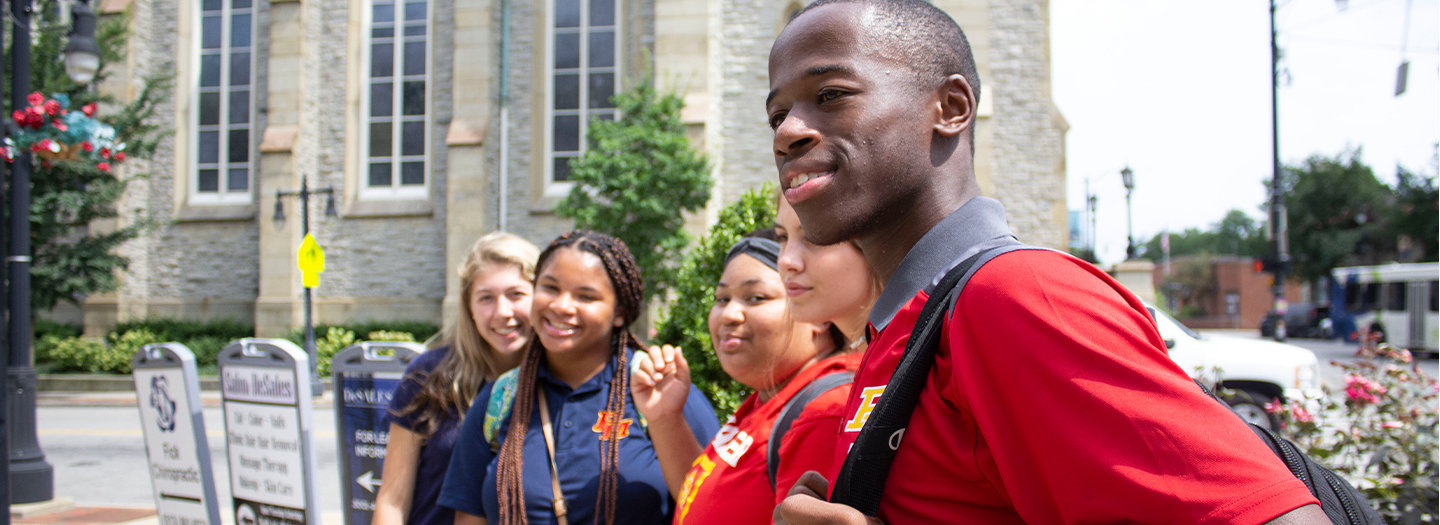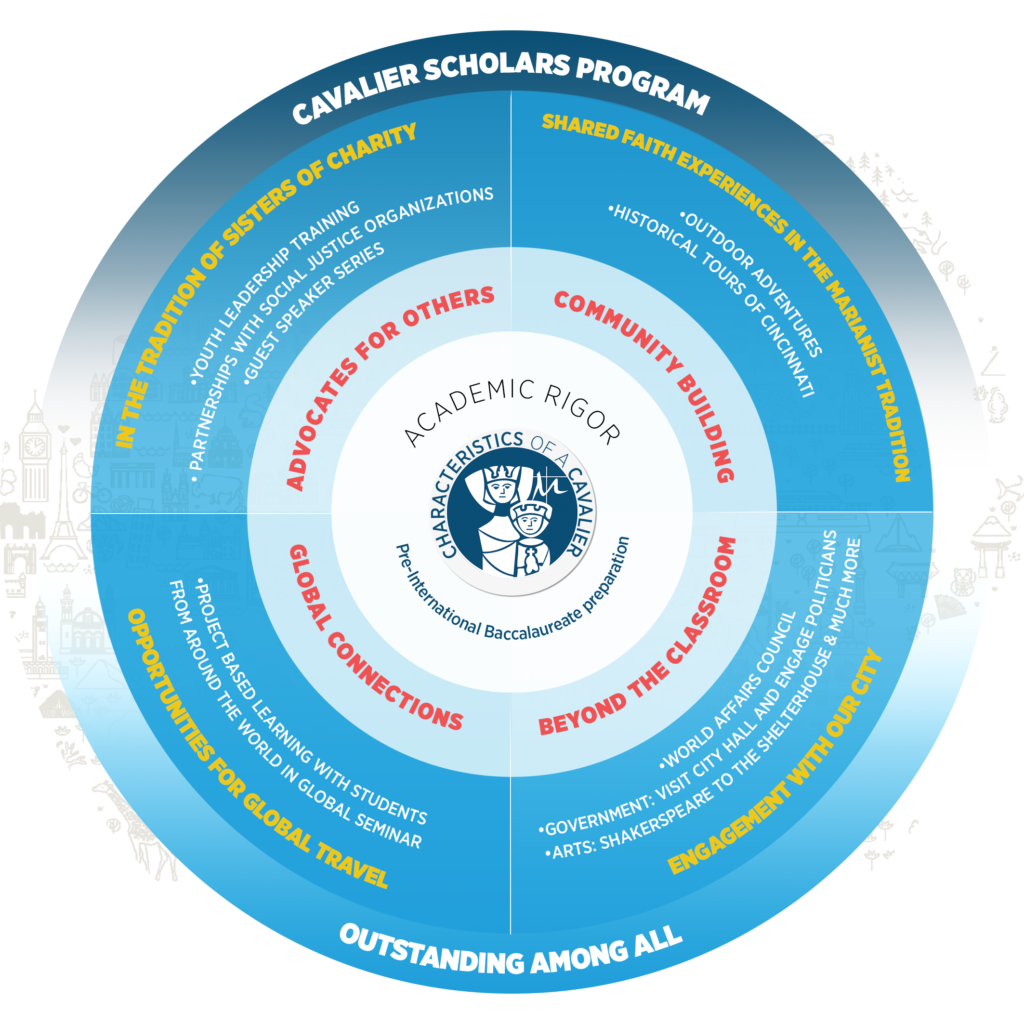Adventures in IB: Learning how to apply knowledge and skills in the Diploma Program Core
February 19, 2021

Made up of the three required components, the International Baccalaureate® (IB) Diploma Programme (DP) core aims to broaden students’ educational experience and challenge them to apply their knowledge and skills.
The three core elements are:
- Theory of knowledge, in which students reflect on the nature of knowledge and on how we know what we claim to know.
- The extended essay, which is an independent, self-directed piece of research, finishing with a 4,000-word paper.
- Creativity, activity, service, in which students complete a project related to those three concepts.
Research Center Director Barret Bell explains two components of the DP Core - Theory of Knowledge and the Extended Essay.
Theory of Knowledge (TOK)
Theory of knowledge (TOK) plays a unique role in the DP Core by providing an opportunity for students to reflect on the nature of knowledge and on how we know what we claim to know.
Along with the Extended Essay and the Creativity, Activity, and Service Project, TOK is one of the DP core components and is composed almost entirely of questions.
The most central of these is "How do we know?" Other questions include:
- What counts as evidence for X?
- How do we judge which is the best model of Y?
- What does theory Z mean in the real world?
Through discussions of these and other questions, students gain greater awareness of their personal and ideological assumptions and develop an appreciation of the diversity and richness of cultural perspectives. TOK aims to make students aware of knowledge’s interpretative nature, including personal ideological biases – whether these biases are retained, revised, or rejected.
It offers students and their teachers the opportunity to:
- reflect critically on diverse ways of knowing and on areas of knowledge
- consider the role and nature of knowledge in their own culture, in others’ cultures, and the wider world.
Additionally, TOK prompts students to:
- be aware of themselves as thinkers, encouraging them to become more acquainted with the complexity of knowledge
- recognize the need to act responsibly in an increasingly interconnected but uncertain world.
Extended Essay (EE)
The extended essay is an independent piece of research, culminating with a 4,000-word paper that provides:
- practical preparation for undergraduate research
- an opportunity for students to investigate a topic of personal interest to them, which relates to one of the student's six DP subjects, or takes the interdisciplinary approach of a World Studies extended essay.
Through the research process for the extended essay, students develop skills in:
- formulating an appropriate research question
- engaging in a personal exploration of the topic
- communicating ideas
- developing an argument.
Participation in this process develops the capacity to analyze, synthesize and evaluate knowledge. An extended essay can also be undertaken in world studies. Students carry out an in-depth interdisciplinary analysis of an issue of contemporary global significance across two IB diploma disciplines.
Students are supported throughout the process of researching and writing the extended essay, with advice and guidance from a supervisor who is usually a teacher at the school.
CAS
Creativity, Activity, Service (CAS) is one of the three essential elements that every student must complete as part of the Diploma Programme (DP).
Studied throughout the Diploma Programme, CAS involves students in a range of activities alongside their academic studies. Students reflect on their CAS experiences as part of the DP and provide evidence of achieving the seven learning outcomes for CAS.
Educators at IB World Schools can read about the seven learning outcomes in the CAS guide, available in the IB store and the Program Resource Centre (PRC).
The three strands of CAS, which are often interwoven with particular activities, are characterized as follows:
- Creativity – arts, and other experiences that involve creative thinking.
- Activity – physical exertion contributing to a healthy lifestyle, complementing academic work elsewhere in the DP.
- Service – an unpaid and voluntary exchange that has a learning benefit for the student. The rights, dignity and autonomy of all those involved are respected.
Students are required to undertake a CAS project To demonstrate these concepts. The project challenges students to:
- show initiative
- demonstrate perseverance
- develop skills such as collaboration, problem-solving, and decision making.
CAS enables students to enhance their personal and interpersonal development by learning through experience. It provides opportunities for self-determination and collaboration with others, fostering a sense of accomplishment and enjoyment from their work. At the same time, CAS is an essential counterbalance to the academic pressures of the DP. There are seven learning outcomes:
- Identify your strengths and develop areas for growth.
- Demonstrate that challenges have been undertaken, developing new skills in the process.
- Demonstrate how to initiate and plan a CAS experience.
- Show commitment to and perseverance in CAS experiences.
- Demonstrate the skills and recognize the benefits of working collaboratively.
- Demonstrate engagement with issues of global significance.
- Recognize and consider the ethics of choices and actions.
A good CAS program should be both challenging and enjoyable – a personal journey of self‑discovery. Each student has a different starting point, and therefore unique goals and needs, but for many, their CAS activities include profound and life‑changing experiences.
 Cavalier Scholars Program
Cavalier Scholars Program
Purcell Marian has launched the Cavalier Scholars Program, which is designed for underclassmen who are
- curious about life, like to ask questions, and enjoy doing the research to distinguish fact from fiction;
- open-minded, care about others, and willing to take a risk; and
- committed to becoming the person God has called you to be.
This program is the pathway to the International Baccalaureate Diploma Program in junior and senior years. The Cavalier Scholars Program’s goal is to build a community of scholars at the Castle — a community that goes beyond the classroom for experiential learning, is empowered to advocate for others, and seizes opportunities to make global connections.
For additional information contact
Mr. Bob Herring '68
Director of the International Baccalaureate Program + Global Programs
bherring@purcellmarian.org
